Security forces arrest Iranian-Norwegian athlete in Sardasht
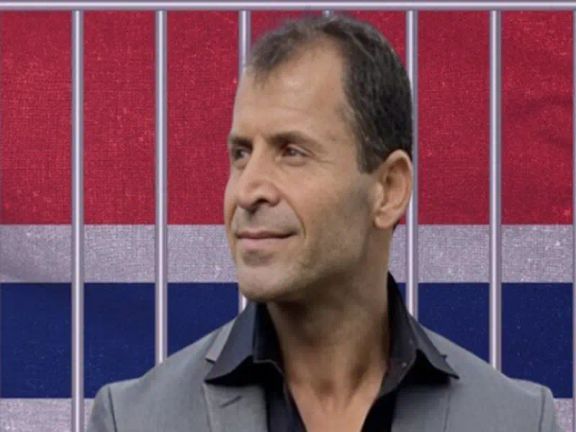
Iranian security forces have raided the home of Iranian-Norwegian athlete Hadi Zaheri, arresting him and transferring him to an unknown location.

Iranian security forces have raided the home of Iranian-Norwegian athlete Hadi Zaheri, arresting him and transferring him to an unknown location.
Hengaw Human Rights Organization, a Kurdish rights group, reported that Zaheri had been summoned to the Sardasht Intelligence Office and interrogated for several hours while visiting his family.
The reason for his arrest on July 2 remains unknown. His passport, along with those belonging to his wife and two children, have also been confiscated.
The professional bodybuilder is one of a long line of dual nationals, the numbers of which remain a closely guarded secret, to be arrested by Iranian forces. They are often held on charges of espionage as Iran continues its policy of diplomatic hostage taking.
Last month, Sweden released former Iranian jailor Hamid Nouri, who faced life imprisonment for his involvement in Iran's 1988 mass executions. In return, Iran released Swedish EU diplomat Johan Floderus and Swedish-Iranian citizen Saeid Azizi.
And last year, the United States released around $6 billion in Iran's frozen funds to secure the release of five dual nationals held in Iran. This arrangement faced strong public criticism for its rewarding the policy of hostage-taking.
After last month's exchange, exiled Prince Reza Pahlavi criticized the Swedish Prime Minister's decision to release Nouri, calling it "an affront to the rule of law, human rights, and basic decency."
He branded the move as "feckless appeasement", arguing that it would only encourage more hostage-taking and blackmail.
Following Zaheri's arrest, rights group Hengaw issued a warning to all Iranian dual nationals that "traveling to Iran can have serious consequences".
It said: "Since the beginning of the "Woman, Life, Freedom" revolution, arrests and heavy sentences for dual citizens have significantly increased. The Iranian government does not recognize dual citizenship and may consider these individuals solely as Iranian citizens."
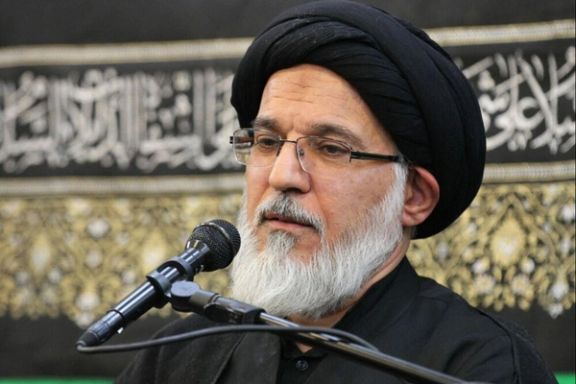
Rivals of hardline candidate Saeed Jalili who was defeated in Iran's presidential election, allege that he and his allies planned to ensure their religious and political mentor would succeed Supreme Leader Ali Khamenei.
Jalili refused to allow the more pragmatic Mohammad-Bagher Ghalibaf to represent the ‘revolutionary front’ in the recent elections against the reform-leaning Masoud Pezeshkian.
Ghalibaf’s supporters have taken to social media to accuse Jalili and his political allies of looking up to Mohammad-Mahdi Mirbagheri, a mid-ranking cleric, as their true religious and political leader. They allege that Jalili's camp only "pretends" to emulate and respect Khamenei.
Jalili was backed by the ultra-hardliner Paydari (Steadfastness) Party led by Sadegh Mahsouli, a business tycoon and interior minister under populist Mahmoud Ahmadinejad, as well as the recently established Jebhe-ye Sobh-e Iran. The latter, often called MASAF, is a political group led by the controversial politician and theorist Ali-Akbar Raefipour. The two political groups have spread their influence to many government and state organizations in the past few years.
The views expressed by Paydari and MASAF members often mirror Mirbagheri’s apocalyptic religious and anti-western political views that are sometimes even more extreme than Khamenei’s.
“First hit the United States in the face and break its wrist and then have fair negotiations with it if it is still inclined to talk,” Mirbagheri says about talks to revive the 2015 nuclear deal (JCPOA). Jalili’s rivals say his supporters even stopped the government of the late President Ebrahim from reaching a nuclear deal to remove US sanctions.
Mirbagheri who heads the Islamic Science Academy of Qom is already one of the 81 members of the Assembly of Experts whose members are to appoint Khamenei’s successor. His followers are often collectively referred to as the “Academy current” by other hardliners.
The 63-year-old cleric who has never held any government office is little known outside seminaries, hardliner political circles, and networks of religious mourning groups (heya’at azadari) run by fundamentalist Shia eulogists. These groups and their leaders (maddahs) have gained huge political influence in the past two decades.
The Paydari Party and MASAF have taken over many top and sensitive positions in state organizations and the parliament where they are a sizeable but very influential minority since 2020.
Mirbagheri’s interpretation of Islam and Velayat-e Faqih (rule of Islamic jurists) is very similar to the views of the late Ayatollah Mohammad-Taqi Mesbah-Yazdi, whom he is now considered a successor.
Mesbah-Yazdi who was held in very high esteem by Khamenei insisted that God appoints the Islamic jurist who becomes the supreme leader of the country and the role of the members of the Assembly of Experts is only to “discover” God’s appointee.
The role of the rest of the Islamic Shia society, in their view, is preparing itself for the emergence of Mahdi, the 12th imam who the Shia believe has been in occultation by divine will since 941 CE.
The loudest and clearest call to suppress the Paydari Party and MASAF in the past few days has come from hardliner politician Abdolreza Davari who campaigned for Ghalibaf but said he would vote for Masoud Pezeshkian in the runoff elections to ward off the “danger of Jalili”.
“The fundamentalist sedition cannot be overcome through political and logical methods. The eye of the sedition must be removed to rid the society of their evil … The eye of the fundamentalists’ sedition cannot be removed without setting up a few gallows,” Davari declared in a tweet Tuesday.
In his tweet, he compared the Paydari Party and MASAF to the Khawarij who turned their backs on the first Shiite Imam, Ali ibn-e Abi Talib and eventually assassinated him as well as Forqan, an anti-clerical Islamist militant group, that assassinated several senior officials of the Islamic Republic.
His post was accompanied by an image of the announcement of the execution of seven members of Forqan on the front page of Kayhan newspaper in March 1980.
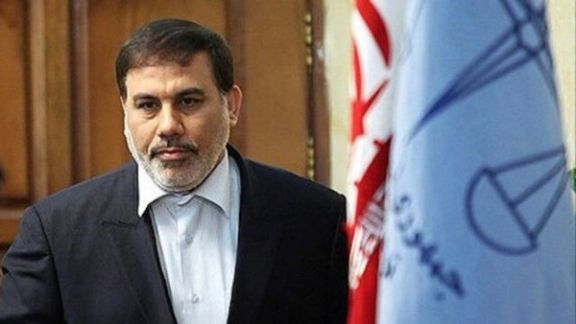
Iran's judiciary has summoned 100 people, with cases against two Telegram channels and 500 Instagram accounts, for promoting a boycott of Iran's presidential polls.
On Tuesday, the spokesman of the judiciary, Asghar Jahangir, said those facing legal action "tried to discourage people from participating in the elections."
Ahead of the recent presidential election, the Press Supervisory Board had warned that "publishing and promoting election boycott symbols" constitutes criminal content and does not require a complainant.
It allowed the public prosecutor independently, or based on the Criminal Content Determination Task Force's findings, to file charges against individuals and media deemed "violators."
Jahangir added, "In total, 3,980 people who committed electoral violations were given legal guidance and warnings. One hundred individuals were summoned and given necessary warnings to prevent continued illegal behavior."
He also reported the arrest of 113 individuals, whom he termed "criminals," in the runoff race of the presidential election, but mentioned that "most of them were released on the same day after giving commitments, providing bail, and appropriate guarantees."
Following the sudden death of former Iranian President Ebrahim Raisi and his entourage in a helicopter crash in May, a snap election was called. After his death, the judiciary also arrested or summoned several citizens for their celebratory reactions to the incident.
During the election campaign, the judiciary filed charges against two media outlets, Hashiyeh News and Bamdad-e-No, for their election coverage and what it called "spreading false news about the elections."
Official figures from the elections showed a turnout of 49.8 percent of eligible voters cast their ballots.
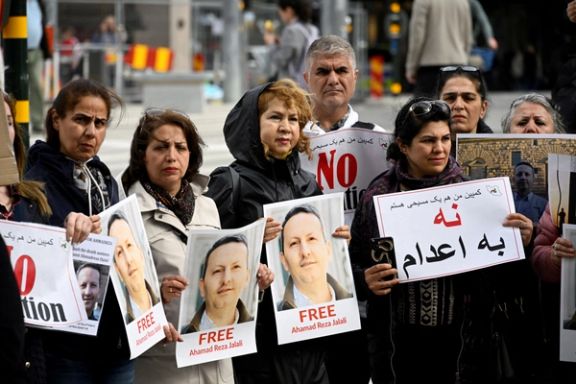
Amnesty International has issued a warning that Swedish-Iranian academic Ahmadreza Jalali, who has been detained in Iran for more than eight years, is at imminent risk of execution following the exhaustion of all legal options to reverse his death sentence.
“Iranian authorities must quash Ahmadreza Jalali’s conviction and death sentence, imposed following grossly unfair trial proceedings, and release him immediately,” the rights group stated on Monday.
“He has heart arrhythmia, anemia, and high blood pressure, for which he has been denied timely and adequate access to health care,” Amnesty's statement further added.
A source close to Jalali's inside the country told Iran International that his execution is imminent.
Jalali's health has worsened after he undertook a hunger strike from June 26 to July 4 to protest his ongoing arbitrary detention, despite a prisoner swap between Iran and Sweden on June 15.
As part of the Stockholm-Tehran accord in June, two Swedish nationals, Johan Floderus, and Saeed Azizi, were exchanged for Hamid Nouri, a former Iranian prison official. Nouri was serving a life sentence in Sweden for his involvement in the mass executions of political prisoners in Iran in 1988.
Swedish authorities asserted that Iran declined to negotiate Jalali’s release within the framework of this agreement.
The release of Nouri to Iran had already sparked backlash among Iranians. Criticism of Sweden's deal with Iran intensified further upon learning that Jalali was left behind.
Political activists condemned the Swedish government's actions as "dangerous". They warned of their "far-reaching consequences," emphasizing that they reinforce Iran's policy of diplomatic hostage-taking, which has led to the imprisonment of numerous dual nationals in Iran.
Last year, the release of five American-Iranians in exchange for the unfreezing of $6 billion in Iranian funds faced similar criticism from rights organizations, who argued that it supported Iran's blatant hostage-taking agenda.
Jalali has criticized the Swedish government's decision to exclude him from the deal as "discriminatory." He has urged the Swedish prime minister to publicly meet with his son and family to clarify why he was left behind and to outline the measures that would be taken on their behalf in the event of his execution.
Jalali, a disaster medicine specialist, was arrested in Tehran in April 2016 and sentenced to death in October 2017 for “corruption on earth” (efsad-e fel-arz) following what has been described as a grossly unfair and arbitrary trial before an Islamic Revolutionary Court.
The court's verdict primarily relied on “confessions” that Jalali asserted were obtained under torture and other ill-treatment during his prolonged solitary confinement, where he was also denied access to legal counsel.
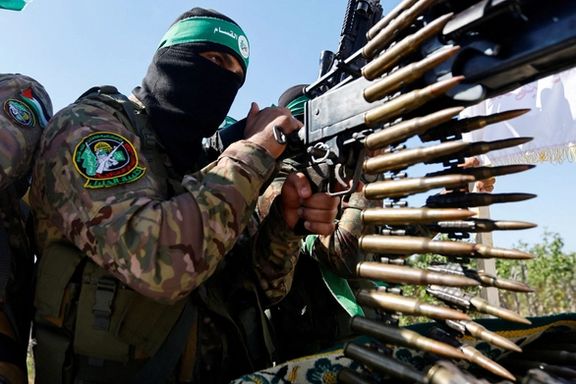
The US Justice Department has been conducting interviews with survivors and families affected by Hamas’ October 7 attack in Israel to build a case against the militant group and its financial supporters, according to Bloomberg.
The report, citing people familiar with the investigation, also says that former hostages and families of US citizens murdered abroad have sat down with prosecutors and FBI agents.
Some have reportedly traveled from Israel and provided videos and text messages to help the authorities build a timeline of the attack and to identify those who carried out the kidnappings.
Citing people familiar with the inquiry, Bloomberg reports that although part of the US probe is looking at acts of terrorism, a broader focus is tackling the financial networks that have propped up Hamas.
This will see prosecutors from US Attorneys’ offices in New York, Washington and the Justice Department’s Counterterrorism Section to investigate any support from countries like Iran and Qatar, which are among the primary financial backers of the terrorist organization.
The inquiry will also reportedly look at whether financing touched US financial institutions or assets.
Last year, Hamas gunmen launched a deadly assault across Gaza's border into Israel, resulting in approximately 1,200 deaths and the firing of thousands of rockets. The victims included children, the elderly, and 364 young attendees of a music festival. Additionally, Hamas abducted over 250 individuals, holding them hostage in Gaza.
The BBC and the Guardian have reported that they have accessed evidence showing instances of rape and sexual assaults during the Hamas attacks. A UN report in March found “reasonable grounds to believe” that Hamas committed sexual violence “in multiple locations” during the attack.
Officials in Tehran have stated that they received no prior warning of the attack carried out by their proxy, with US intelligence indicating that senior Iranian government officials were taken by surprise by the assault. However, almost immediately after the attack, government backed celebrations took place in Tehran and officials and state media have been praising Hamas and pledging continued support.
In October 2023, the Wall Street Journal reported that Iranian security officials helped plan the attack on Israel and gave the green light for the assault at a meeting in Beirut. It also reported later that month that Hamas fighters trained in Iran before the attack.
Easter this month, more than 100 victims and relatives of victims of the Hamas attack sued Iran, Syria and North Korea for $4 billion, accusing the countries of providing Hamas support.
The lawsuit filed in federal court in Washington, DC, by the Anti-Defamation League is the largest case against foreign countries in connection with the attack, and the first backed by a Jewish organization, the ADL said in a press release.
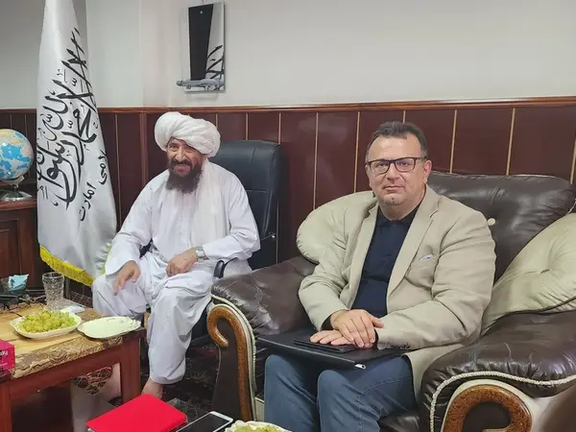
The Taliban have declared a senior Iranian diplomat "persona non grata", giving him only a few hours to leave Afghanistan, informed sources told Afghanistan International.
The Taliban say Ali Mojani, an advisor to Iran's special representative for Afghan affairs, has "overstepped his boundaries" and must leave Afghanistan immediately, the sources said.
Sources told Afghanistan International that the move is a response to Iran's expulsion of a Taliban diplomat from Mashhad last December. Salim, the Taliban diplomat, was expelled after beating up and torturing an Iranian photographer at the Afghan consulate in Mashhad.
Mojani had recently stated that Taliban members did not allow him to perform Eid al-Adha prayers led by Mullah Hibatullah, the Taliban leader, at Eidgah mosque in Kandahar.
He said he had previously sent an official letter to the Taliban's Ministry of Foreign Affairs to participate in the Eid prayers, but the Ministry did not adhere to diplomatic protocols and did not respond to his official request.
Tensions persist between Iran and the Taliban, particularly regarding water issues.
In January, the Taliban's foreign minister, Amir Khan Muttaqi, visited Iran and advocated for increased economic collaboration. Muttaqi met with economic activists from Iran and Afghanistan, urging Iranian traders to capitalize on opportunities in the Afghan market.
Nevertheless, critics within Iran have raised concerns about the government's open borders policy, speculating about potential hidden agendas. Some suggest that authorities might be facilitating illegal Afghan immigration to address population decline or to strengthen the military by recruiting young Shiite Hazara Afghans.
Iran's former Foreign Minister Mohammad Javad Zarif, who is expected to serve as a top advisor or cabinet member in the government of president-elect Masoud Pezeshkian, recently said the Taliban's legitimacy remains in question in spite of their ruling neighboring Afghanistan.
In an interview in March, Zarif said the question of the Taliban's legitimacy in Afghanistan remains a highly debated issue both domestically and internationally. He added that “if Iran remains passive in the face of regional dynamics involving the United States, Russia, China, and Pakistan, the matter of Taliban legitimacy could escalate into both an opportunity and a threat for the Islamic Republic.”